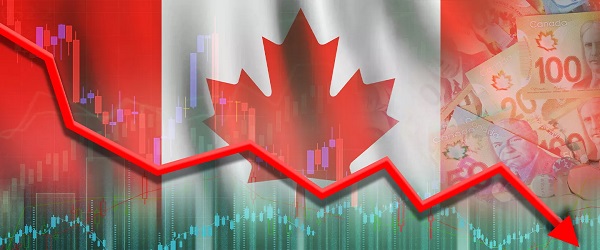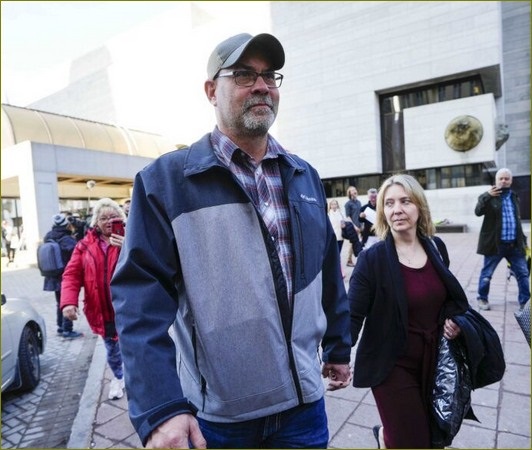Business
Next federal government has to unravel mess created by 10 years of Trudeau policies

From the Fraser Institute
It’s no exaggeration to describe the Trudeau years as almost a “lost decade” for Canadian prosperity.
The Justin Trudeau era is ending, after nine-and-a-half years as prime minister. His exit coincides with the onset of a trade crisis with the United States. Trudeau leaves behind a stagnant Canadian economy crippled by dwindling productivity, a long stretch of weak business investment, and waning global competitiveness. These are problems Trudeau chose to ignore throughout his tenure. His successors will not have that luxury.
It’s no exaggeration to describe the Trudeau years as almost a “lost decade” for Canadian prosperity. Measured on a per-person basis, national income today is barely higher than it was in 2015, after stripping out the effects of inflation. On this core metric of citizen wellbeing, Canada has one of the worst records among all advanced economies. We have fallen far behind the U.S., where average real income has grown by 15 per cent over the same period, and most of Europe and Japan, where growth has been in the range of 5-6 per cent.
Meanwhile, Ottawa’s debt has doubled on Trudeau’s watch, and both federal government spending and the size of the public service have ballooned, even as service levels have generally deteriorated. Housing in Canada has never been more expensive relative to average household incomes, and health care has never been harder to access. The statistics on crime point to a decline in public safety in the last decade.
Reviving prosperity will be the most critical task facing Trudeau’s successor. It won’t be easy, due in part to a brewing trade war with the U.S. and the retreat from open markets and free trade in much of the world. But a difficult external environment is no reason for Canada to avoid tackling the domestic impediments that discourage economic growth, business innovation and entrepreneurial wealth creation.
In a recent study, a group of economists and policy advisors outlined an agenda for renewed Canadian prosperity. Several of their main recommendations are briefly summarized below.
Return to the balanced budget policies embraced by the Chretien/Martin and Harper governments from 1995 to 2015. Absent a recession, the federal government should not run deficits. And the next government should eliminate ineffective spending programs and poor-performing federally-funded agencies.
Reform and reduce both personal and business income taxes. Canada’s overall income tax system is increasingly out of line with global best practise and has become a major barrier to attracting private-sector investment, top talent and world-class companies. A significant overhaul of the country’s tax policies is urgently needed.
Retool Ottawa’s existing suite of climate and energy policies to reduce the economic damage done by the long list of regulations, taxes, subsidies and other measures adopted Trudeau. Canada should establish realistic goals for lowering greenhouse gas emissions, not politically manufactured “targets” that are manifestly out of reach. Our climate policy should reflect the fact that Canada’s primary global comparative advantage is as a producer and exporter of energy and energy-intensive goods, agri-food products, minerals and other industrial raw materials which collectively supply more than half of the country’s exports.
Finally, take a knife to interprovincial barriers to trade, investment and labour mobility. These long-standing internal restrictions on commerce increase prices for consumers, inhibit the growth of Canadian-based companies, and result in tens of billions of dollars in lost economic output. The next federal government should lead a national effort to strengthen the Canadian “common market” by eliminating such barriers.
Alberta
Alberta announces citizens will have to pay for their COVID shots

From LifeSite News
The government said that it has decided to stop ‘waste’ by not making the shots free starting this fall.
Beginning this fall, COVID shots in the province will have to be pre-ordered at the full price, about $110, to receive them. (This will roll out in four ‘phases’. In the first phases COVID shots will still be free for those with pre-existing medical conditions, people on social programs, and seniors.)
The UCP government in a press release late last week noted due to new “federal COVID-19 vaccine procurement” rules, which place provinces and territories as being responsible for purchasing the jabs for residents, it has decided to stop “waste” by not making the jab free anymore.
“Now that Alberta’s government is responsible for procuring vaccines, it’s important to better determine how many vaccines are needed to support efforts to minimize waste and control costs,” the government stated.
“This new approach will ensure Alberta’s government is able to better determine its overall COVID-19 vaccine needs in the coming years, preventing significant waste.”
The New Democratic Party (NDP) took issue with the move to stop giving out the COVID shots for free, claiming it was “cruel” and would place a “financial burden” on people wanting the shots.
NDP health critic Sarah Hoffman claimed the move by the UCP is health “privatization” and the government should promote the abortion-tainted shots instead.
The UCP said that in 2023-2024, about 54 percent of the COVID shots were wasted, with Health Minister Adriana LaGrange saying, “In previous years, we’ve seen significant vaccine wastage.”
“By shifting to a targeted approach and introducing pre-ordering, we aim to better align supply with demand – ensuring we remain fiscally responsible while continuing to protect those at highest risk,” she said.
The UCP government said that the COVID shots for the fall will be rolled out in four phases, with those deemed “high risk” getting it for free until then. However, residents who want the shots this fall “will be required to pay the full cost of the vaccine, the government says.”
The jabs will only be available through public health clinics, with pharmacies no longer giving them out.
The UCP also noted that is change in policy comes as a result of the Federal Drug Administration in the United States recommending the jabs be stopped for young children and pregnant women.
The opposite happened in Canada, with the nation’s National Advisory Committee on Immunization (NACI) continuing to say that pregnant women should still regularly get COVID shots as part of their regular vaccine schedule.
The change in COVID jab policy is no surprise given Smith’s opposition to mandatory shots.
As reported by LifeSiteNews, early this year, Smith’s UCP government said it would consider halting COVID vaccines for healthy children.
Smith’s reasoning was in response to the Alberta COVID-19 Pandemic Data Review Task Force’s “COVID Pandemic Response” 269-page final report. The report was commissioned by Smith last year, giving the task force a sweeping mandate to investigate her predecessor’s COVID-era mandates and policies.
The task force’s final report recommended halting “the use of COVID-19 vaccines without full disclosure of their potential risks” as well as outright ending their use “for healthy children and teenagers as other jurisdictions have done,” mentioning countries like “Denmark, Sweden, Norway, Finland, and the U.K.”
The mRNA shots have also been linked to a multitude of negative and often severe side effects in children and all have connections to cell lines derived from aborted babies.
Many Canadian doctors who spoke out against COVID mandates and the experimental mRNA injections were censured by their medical boards.
LifeSiteNews has published an extensive amount of research on the dangers of the experimental COVID mRNA jabs that include heart damage and blood clots.
Business
Carney’s European pivot could quietly reshape Canada’s sovereignty

This article supplied by Troy Media.
Canadians must consider how closer EU ties could erode national control and economic sovereignty
As Prime Minister Mark Carney attempts to deepen Canada’s relationship with the European Union and other supranational institutions, Canadians should be asking a hard question: how much of our national independence are we prepared to give away? If you want a glimpse of what happens when a country loses control over its currency, trade and democratic accountability, you need only look to Bulgaria.
On June 8, 2025, thousands of Bulgarians took to the streets in front of the country’s National Bank. Their message was clear: they want to keep the lev and stop the forced adoption of the euro, scheduled for Jan. 1, 2026.
Bulgaria, a southeastern European country and EU member since 2007, is preparing to join the eurozone—a bloc of 20 countries that share the euro as a common currency. The move would bind Bulgaria to the economic decisions of the European Central Bank, replacing its national currency with one managed from Brussels and Frankfurt.
The protest movement is a vivid example of the tensions that arise when national identity collides with centralized policy-making. It was organized by Vazrazdane, a nationalist, eurosceptic political party that has gained support by opposing what it sees as the erosion of Bulgarian sovereignty through European integration. Similar demonstrations took place in cities across the country.
At the heart of the unrest is a call for democratic accountability. Vazrazdane leader Konstantin Kostadinov appealed directly to EU leaders, arguing that Bulgarians should not be forced into the eurozone without a public vote. He noted that in Italy, referendums on the euro were allowed with support from less than one per cent of citizens, while in Bulgaria, more than 10 per cent calling for a referendum have been ignored.
Protesters warned that abandoning the lev without a public vote would amount to a betrayal of democracy. “If there is no lev, there is no Bulgaria,” some chanted. For them, the lev is not just a currency: it is a symbol of national independence.
Their fears are not unfounded. Across the eurozone, several countries have experienced higher prices and reduced purchasing power after adopting the euro. The loss of domestic control over monetary policy has led to economic decisions being dictated from afar. Inflation, declining living standards and external dependency are real concerns.
Canada is not Bulgaria. But it is not immune to the same dynamics. Through trade agreements, regulatory convergence and global commitments, Canada has already surrendered meaningful control over its economy and borders. Canadians rarely debate these trade-offs publicly, and almost never vote on them directly.
Carney, a former central banker with deep ties to global finance, has made clear his intention to align more closely with the European Union on economic and security matters. While partnership is not inherently wrong, it must come with strong democratic oversight. Canadians should not allow fundamental shifts in sovereignty to be handed off quietly to international bodies or technocratic elites.
What’s happening in Bulgaria is not just about the euro—it’s about a people demanding the right to chart their own course. Canadians should take note. Sovereignty is not lost in one dramatic act. It erodes incrementally: through treaties we don’t read, agreements we don’t question, and decisions made without our consent.
If democracy and national control still matter to Canadians, they would do well to pay attention.
Isidoros Karderinis was born in Athens, Greece. He is a journalist, foreign press correspondent, economist, novelist and poet. He is accredited by the Greek Ministry of Foreign Affairs as a foreign press correspondent and has built a distinguished career in journalism and literature.
Troy Media empowers Canadian community news outlets by providing independent, insightful analysis and commentary. Our mission is to support local media in helping Canadians stay informed and engaged by delivering reliable content that strengthens community connections and deepens understanding across the country.
-

 Business22 hours ago
Business22 hours agoCarney’s European pivot could quietly reshape Canada’s sovereignty
-

 Crime1 day ago
Crime1 day agoManhunt on for suspect in shooting deaths of Minnesota House speaker, husband
-

 Alberta22 hours ago
Alberta22 hours agoAlberta’s grand bargain with Canada includes a new pipeline to Prince Rupert
-

 conflict8 hours ago
conflict8 hours ago“Evacuate”: Netanyahu Warns Tehran as Israel Expands Strikes on Iran’s Military Command
-

 Aristotle Foundation4 hours ago
Aristotle Foundation4 hours agoThe Canadian Medical Association’s inexplicable stance on pediatric gender medicine
-

 Energy7 hours ago
Energy7 hours agoCould the G7 Summit in Alberta be a historic moment for Canadian energy?
-

 Bruce Dowbiggin7 hours ago
Bruce Dowbiggin7 hours agoWOKE NBA Stars Seems Natural For CDN Advertisers. Why Won’t They Bite?
-

 Crime7 hours ago
Crime7 hours agoMinnesota shooter arrested after 48-hour manhunt








